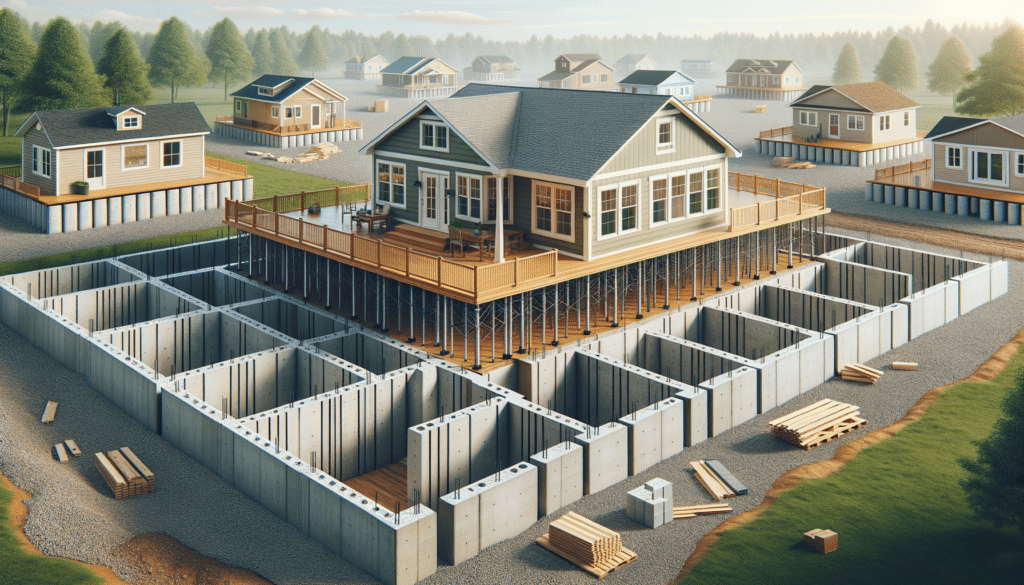Understanding Modular Home Foundations
Modular homes have gained popularity due to their cost-effectiveness, speed of construction, and flexibility in design. However, the foundation is a critical aspect that ensures the home’s stability and longevity. A well-chosen foundation not only supports the structure but also protects it from environmental factors. This section explores the importance of selecting the right foundation for modular homes, considering factors such as soil type, climate, and budget.
Concrete Slab Foundations
Concrete slab foundations are a common choice for modular homes, especially in warmer climates where ground freezing is not a concern. This foundation type involves pouring concrete directly onto the ground, creating a solid base for the home. The benefits of a concrete slab include its affordability and quick installation. Additionally, it provides a strong, durable surface that can support the weight of a modular home effectively.
However, there are some considerations to keep in mind. Concrete slabs may not be suitable for areas prone to flooding or with poor drainage, as water can seep into the home. Insulation can also be a challenge, as the slab can conduct cold temperatures from the ground into the home. Despite these challenges, the concrete slab remains a popular choice due to its cost-effectiveness and simplicity.
Basement Foundations
Basement foundations offer additional living or storage space beneath the home, making them an attractive option for homeowners looking to maximize their square footage. This type of foundation involves excavating a space and constructing walls to support the home. Basements are particularly beneficial in colder climates, as they provide a buffer against freezing temperatures and offer increased insulation.
While basements offer many advantages, they come with higher costs and longer construction times compared to other foundation types. Homeowners must also consider the potential for water intrusion and the need for proper waterproofing measures. Despite these challenges, basements remain a favored choice for those seeking extra space and enhanced insulation.
Crawl Space Foundations
Crawl space foundations are another popular option, offering a middle ground between a concrete slab and a full basement. This type of foundation elevates the home slightly off the ground, creating a space between the earth and the home. Crawl spaces provide easy access to plumbing and electrical systems, making maintenance more straightforward.
One of the key benefits of crawl space foundations is their adaptability to various terrains and climates. They are particularly useful in areas with high water tables or where flooding is a concern, as they elevate the home above potential water damage. However, proper ventilation is crucial to prevent moisture buildup and potential mold growth. Overall, crawl spaces offer a versatile solution for modular homes, balancing cost and functionality.
Pier and Beam Foundations
Pier and beam foundations are ideal for modular homes in areas with challenging soil conditions or uneven terrain. This foundation type involves placing concrete piers deep into the ground, which support beams that hold up the home. The elevated design provides excellent protection against flooding and allows for easy access to utilities.
While pier and beam foundations offer several advantages, they can be more expensive and time-consuming to install compared to other options. Additionally, proper insulation and moisture control are essential to prevent issues such as cold floors or pest infestations. Despite these considerations, pier and beam foundations are a reliable choice for homes in areas with specific environmental challenges.
Conclusion: Choosing the Right Foundation
When selecting a foundation for a modular home, homeowners must consider various factors, including climate, soil conditions, and budget. Each foundation type offers distinct advantages and challenges, making it essential to assess individual needs and preferences. Whether opting for a concrete slab, basement, crawl space, or pier and beam foundation, the right choice will ensure the stability and longevity of the modular home.
Key considerations for choosing a foundation:
- Climate and environmental conditions
- Soil type and drainage capabilities
- Budget constraints
- Desired additional space or storage
- Ease of access to utilities
By carefully evaluating these factors, homeowners can make informed decisions and enjoy the benefits of a well-supported and durable modular home.





